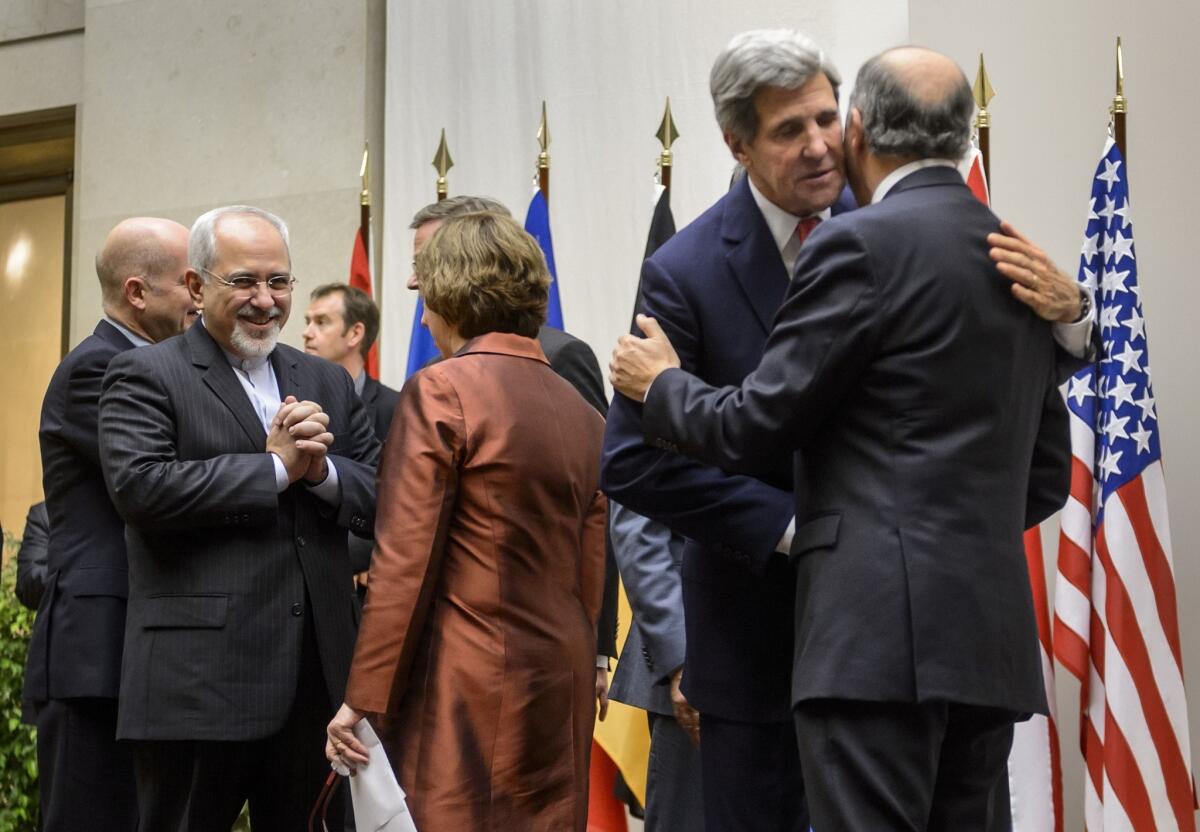Can the U.S. be trusted to keep its side of the bargain with Iran?

- Share via
Much of the reaction to Saturday’s nuclear agreement between Iran and the world’s six biggest powers has focused on U.S. and Israeli fears that Iran can’t be trusted to keep its word.
But there’s a flip side to that problem too: Can the United States be trusted to keep its side of the bargain?
In the interim deal, Iran pledged to “neutralize” all of its highly enriched uranium, to freeze the size of its low-enriched uranium stockpile and to stop installing new enrichment centrifuges for six months. In return, the United States and its allies promised to stop imposing new economic sanctions on Iran and to allow Tehran to recoup about $7 billion in earnings.
U.S. officials say that’s a modest amount of relief, and assert that the sanctions that remain will cost Iran more than $30 billion during the same six months. Nevertheless, Iran’s business community and its population rejoiced; the Tehran Stock Exchange index soared, and Iran’s battered currency, the rial, instantly rose 3%.
Now that Iran’s supreme leader, Ayatollah Ali Khamenei, has seen how popular even a modest relaxation of sanctions is, U.S. officials hope he will approve a more permanent agreement with tighter limits on the nuclear program.
“The economic impact is small, but the political impact in Tehran is real,” one U.S. official told me last weekend.
The interim deal isn’t just a device to see whether Iran will keep a bargain to limit its nuclear activities, he said. “We’ll demonstrate our ability to deliver too,” he said, on the side of sanctions relief.
Just as Americans and Israelis worry about Iran’s intentions, he noted, many Iranian officials suspect that the United States is bent on undermining their regime and isn’t sincere about making a long-term deal. They have a point; regime change in Tehran remains a long-term goal of U.S. foreign policy, even if it’s not always made explicit or openly pursued.
That’s why the Obama administration is pushing back against demands in Congress for new sanctions legislation, even in the form of sanctions that kick in only if Iran doesn’t conclude a permanent agreement in six months. Administration officials worry that new sanctions would prompt Iran’s hard-liners to block a long-term deal.
“Our preference is to not enact any new sanctions during the life of this agreement,” another official said. Secretary of State John F. Kerry even suggested that President Obama might veto a new sanctions law, but he added: “We don’t want it to come to that.”
If Iran violates the interim deal or fails to move toward a permanent agremeent, the officials said, don’t worry. “It won’t be hard to persuade Congress to pass new sanctions then,” the official said.
ALSO:
Iran’s Rouhani: He’s no Gorbachev
McManus: Will the NSA be reformed?
U.S.-Iran thaw began with months of secret meetings
Follow Doyle McManus on Twitter @doylemcmanus and Google+
More to Read
A cure for the common opinion
Get thought-provoking perspectives with our weekly newsletter.
You may occasionally receive promotional content from the Los Angeles Times.










